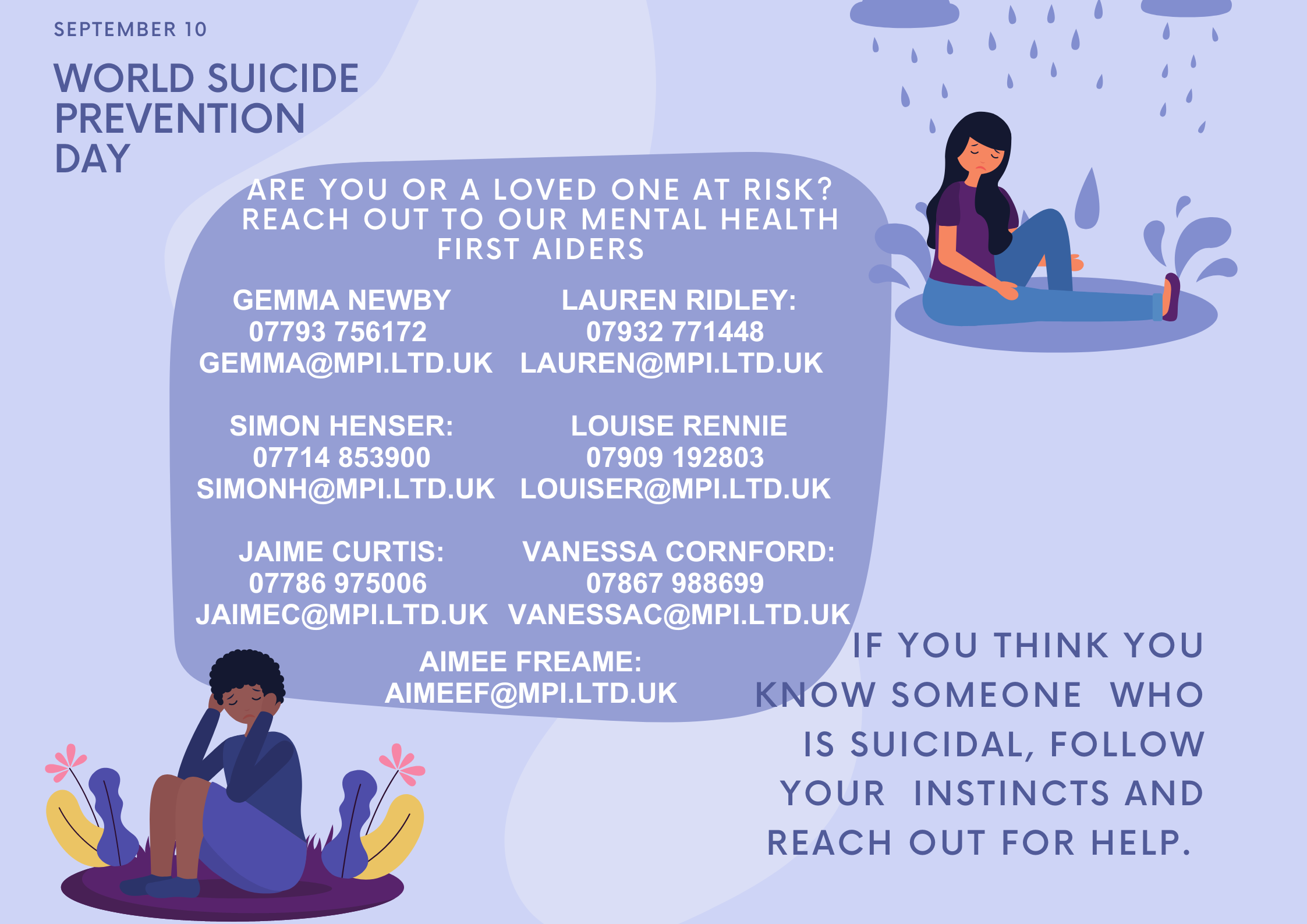
World Suicide Prevention Day
For those that are not aware it is World Suicide Prevention Day on the 10th September so whilst I was thinking what to cover for Septembers blog I thought it would be important to discuss why people don’t talk about their mental health more, even now.
The following stats were taken from the MHFA England site - There were 5,583 suicides registered in England and Wales in 2021. Each week, approximately 115 people die by suicide in the UK. Research has found that as many as 650 suicides in the UK, or 10% each year, could be work-related. (All data from Office for National Statistics reporting and its Hazards Campaign.)
Yes Mental Health is in the news a lot more and yes companies are investing money into training for Mental Health First Aiders, but how many people realistically would consider talking to a Mental Health First Aider in work and would instead sit there struggling, as they are concerned about what that person may think of them or if there would be any repercussions with their job if their employers knew.
Stop right there. Let’s break it down as to the process if you do ever get to a point where things are becoming too much and are starting to affect you at work.
Your Company Mental Health First Aiders are bound by an agreement that anything you tell them, does not go any further unless you want it to - The only time that anything may be done is if the First Aider is concerned about your safety and thinks that you may do harm to yourself, in which case, may step in to ensure that this does not happen. Generally, we/they are there to listen and listening is the key word.
As you know, there is more and more awareness of mental health, however mental health problems are still being discriminated against and stigmatised. This is the reason I started these blogs, to spread the awareness further, to try and help, even if it’s just one person I help, to let you know that you are not alone. Still, so many people who are in distress keep it to themselves and do not reveal how they are really feeling due to the stigma still involved and not knowing how people will react. Some people feel ashamed that they are suffering, which should not be the case. Mental Health issues can affect anyone at any time, so it is never something you should be ashamed of.
MPI are trying hard to create a workplace culture which allows employees to be themselves and this in turn enables the workplace to be an environment where people feel safe, so that it is not so distressing if you do need help to approach someone. They have ensured that there are mental health First Aiders on hand, so that if you ever need assistance, you have the help and support when it is needed. Even so, the decision to disclose distress at work is not one people take lightly, which the Mental Health First Aiders realise. The role of a Mental Health First Aider is to ensure that employees have a voice and feel valued and trusted.
You need to know this information, because according to the MHFA England – 1 person in 4 experiences some form of mental health issue in a year and estimates suggest that at least 1 in 6 workers experience depression, anxiety, or stress-related issues at any one time.
So, if you are struggling and have made the decision to reach out and talk to someone – this may be one of the bravest things you may do in your lifetime.
What to expect if it’s an in-house Mental Health First Aider.
They will treat you with respect and dignity and your problems will not be trivialised
Emotional support and understanding will be given
Practical help where possible will be given
You will walk away we hope with the information/referrals you need that will assist you along with way.
They are not doctors but are a listening tool that can then signpost you in the right direction to get you the help you need and provide the support you need to be able to do this.
What you will not get, is being told ‘oh well its just a mental health issue, get over it’ or ‘snap out of it’
There will be no judgment
So, to close this blog for September please remember, you are never alone, you don’t need to struggle and pretend you are okay if you are not, sometimes it can make things so much worse trying to put the happy face on when were not okay and I speak from experience when I say this, it is exhausting.
Talking about your feelings isn’t a sign of weakness. It’s part of taking charge of your well-being and doing what you can to stay healthy.
If you don’t feel able to talk about feelings at work, make sure there’s someone you can discuss work pressures with – partners, friends and family can all be a sounding board.
And don't forget if you are worried about a friend or family member who you believe many be feeling suicidal you can get support and help for this too.
